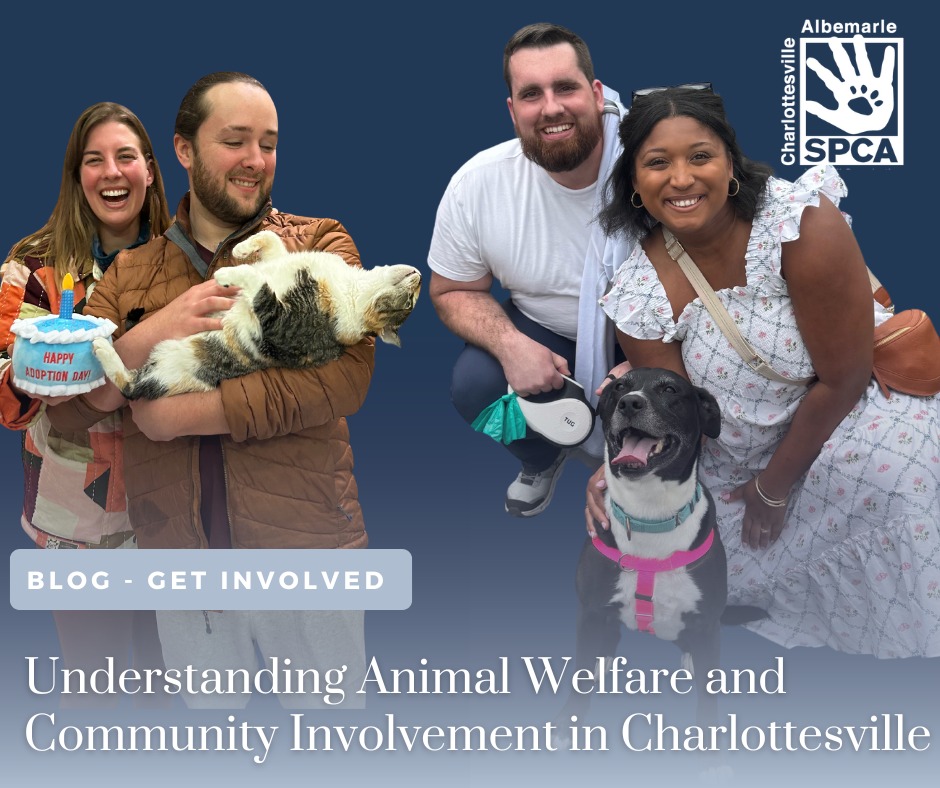April 30th marks a special occasion in Charlottesville—in a modest yet meaningful historic moment, the City of Charlottesville has officially declared April 30th to be “Adopt a Shelter Pet Day”. This day is not just a chance to bring a new companion into your home; it’s also an opportunity to reflect on the progress we’ve made in animal welfare, and how each of us can continue to make a difference.
The journey toward today’s animal welfare standards in our state began over a century ago: Virginia’s first laws against animal cruelty were enacted in 1893, setting a precedent for the criminalization of animal abuse. These laws were primarily focused on work and livestock animals, which were integral to daily life and the economy at the time. A mere 31 years later, the Charlottesville-Albemarle SPCA was officially founded, after operating unofficially out of the homes of concerned citizens since the early 1900’s. As societal attitudes have evolved, so too have the protections afforded to our animal companions, and the infrastructure that supports them.
In the mid-20th century, attention began to shift more significantly towards the treatment of pets and not just working animals. The post-war era saw a rise in pet ownership, which in turn increased public interest in their welfare. This period marked the beginning of more comprehensive laws that included provisions for companion animals.
The 1980s and 90s saw a series of tighter regulations emerging, focusing on various aspects of animal welfare. Virginia adopted stricter laws to regulate puppy mills and other breeding facilities, increased penalties for animal cruelty, and improved enforcement mechanisms. The establishment of animal control departments and the integration of animal welfare considerations into local law enforcement agencies helped to ensure that these laws were not merely symbolic, but effectively enforced. In 2015, Virginia established an Animal Law Unit within its Attorney General’s office to assist in prosecuting cases of animal cruelty, neglect and abuse – to this day, it is the only one of its kind in the US.
Advocacy groups played a crucial role during this time, pushing for more stringent laws and better enforcement. Public sentiment, increasingly influenced by media coverage of animal welfare issues and the work of animal rights organizations, supported these legislative changes, leading to stronger animal protection laws. Alongside these legislative changes, local humane welfare organizations received increasing support, allowing for more and more infrastructure to support the outcomes the community wanted to see for its homeless animals.
In 2019, Virginia took a significant leap forward with Tommie’s Law. Prior to its enactment, an animal would have to die as a result of cruelty in order for the perpetrator to be charged with a felony. This law elevated the cruelty itself to a felony offense, regardless of the outcome, thus underscoring the state’s commitment to serious legal repercussions for those harming animals. Tommie’s Law reflects a broader societal acknowledgment that the way we treat animals speaks volumes about our community’s values.
All of these advancements in legislation and infrastructure were achieved through active community involvement; the power of our collective voices cannot be overstated. Today, our commitment to animal welfare is being tested by legislative challenges such as HB 221, which poses a threat to Trap-Neuter-Vaccinate-Return (TNVR) programs. These initiatives are crucial for managing feral cat populations humanely. HB 221, however, could undermine these efforts, affecting not just the cats but the biodiversity of the areas they inhabit.
Engaging in local governance is more than a responsibility; it’s a real agent of change. Here’s how you can get involved:
- Educate Yourself and Your Community: Understanding the full implications of laws like HB 221 is crucial. Share this knowledge with your community.
- Contact Your State/Local Representatives: Express your concerns and suggestions. Your representatives are there to hear from their constituents.
- Participate in Local Meetings: City council meetings and other local government gatherings are where decisions are made. Be present to advocate for what you believe in.
- Support Local Animal Welfare Organizations: Whether through volunteering, donating, or adopting, supporting these organizations helps strengthen their voice in advocacy.
On Adopt a Shelter Pet Day, we’re invited not just to celebrate, but also to reflect and recognize the impact of our involvement, which can shape protective measures like Tommie’s Law, while also addressing potential challenges such as HB 221. Let’s take this opportunity to appreciate progress made and prepare for continued efforts ahead.
Your voice matters—make it heard for the sake of those who cannot speak for themselves.
To read more about HB221 from our Executive Director, Libby Jones, click here!
For more information on animal welfare laws and history in your area, check out MSU’s Animal Legal and Historical Center at https://www.animallaw.info/




Leave A Comment